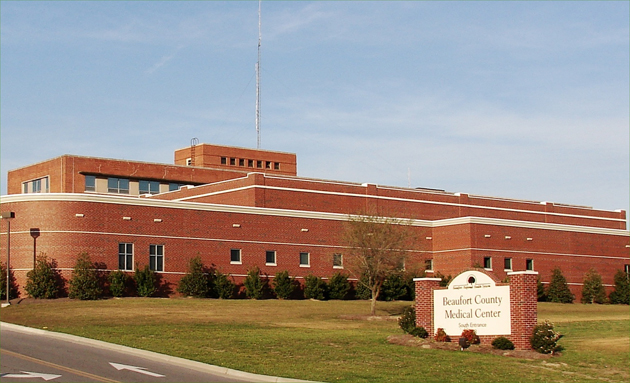Publisher's Note: This article originally appeared in the Beaufort Observer.
The blame for this can be put squarely on the General Assembly
Those of us at the Beaufort Observer have spent more time reporting on the Beaufort Hospital than any other single story in the last three years. It is, as we have learned, a sordid tale, with many angles. It is a story of inept management, which failed to establish a billing system that would enable proper payment for services rendered. After it was too late, the public learned that millions of dollars went uncollected, not because the patients could not pay, but because the accounts were not properly managed. It is a story in negligent oversight by a board that failed to correct the mis-management, until it was too late. It is a story of backroom deals made with doctors that saw practices acquired without knowing about the financial health of the practice both before acquisition and afterward. In fact, there was no accounting system that showed which practices were making money and which were losing money, or how much.
It is a story of a county commissioner (Jay McRoy, who is an accountant) who served for years as the Board of Commissioner's representative on the Hospital Board while his daughter was top executive in the Accounting Department. McRoy consistently told the Commissioners that things were fine with the hospital.
He blamed "the system," contending that it was not possible to operate the hospital at a breakeven point because of the way Medicare and Medicaid reimburses hospitals. We now know, as you will see, that this was not only not true, but in fact many hospitals make enormous profits from the system McRoy contended would not permit Beaufort to keep operating its hospital.
It is a story of self-serving politicians trying to take advantage of the hospital's dire situation to give it away to a favored operator. When it became obvious that the die had been cast and the hospital could not be saved, a group of politicians and politically connected individuals conducted a campaign to convey the hospital to University Health Systems (UHS—now "Vidant"), at first without getting bids or proposals from other potential operators. Yielding to an uproar, the Hospital Board then decided to advertise for bids.
But before the bids were in, and before anyone could know what even UHS was offering to acquire the Hospital, Commissioners Jay McRoy, Al Klemm and candidate Jerry Evans, along with the Committee of 100 and the local print newspaper (Washington Daily News) as well as a number of other UHS cheerleaders came out in favor of selling the Hospital to UHS. Their primary argument was that UHS is a non-profit organization and therefore would offer better service at a lower cost than a for-profit organization would. Some of these same "UHS cheerleaders" threatened and intimidated another bidder, the for-profit Community Health System (CHS), to withdraw from the bidding even though CHS offered a considerably better bid, by a minimum of $50 million or potentially much more at the end of a thirty-year lease. That left Beaufort in a "take it or leave it" predicament with UHS.
Incumbent in this loss of the property and business value of the Hospital is the fact that the local community lost control of its health care system. Although there is a token community-based board it is only advisory and has no actual control over the service delivery system for health care in the county. That control is vested in a board that sits in Greenville and has no county-selected members. The Greenville-based Vidant even determines who will represent the public in Beaufort County on the "advisory group" at the local hospital.
The Vidant system operates in secret. They use "confidential contracts" to hide from the public what it is doing, except for the "press release charade" method of public information. This group refuses to disclose information that would be public records if they were not hiding behind Legislative provided exemptions from the Open Meetings and Public Records laws.
Now the News & Observer is beginning to expose the corruption of the public trust that exists in the health care system in the state.
The N&O series has already shown that these "non-profit" operations do indeed make a profit. In fact some may considerably more profit than comparable "for-profit" operators. Thus, the primary premise upon which McRoy, Klemm, Evans and other politicians claimed UHS would be the better choice is clearly false.
Moreover, now the N&O has exposed where much of this "profit" goes…to the top management.
The
latest installment in the N&O series is entitled "Million-dollar hospital executives in North Carolina." The N&O's lead in this part of the series is:
Twenty-five N.C. nonprofit hospital executives made total compensation exceeding $1 million in 2010 or 2011. Most worked for Novant Health or Carolinas HealthCare System.

Executive raises have been generous. So have retirement packages. In 2009, Pitt County Memorial Hospital, in Greenville, N.C., reported total compensation of $8.7 million to former CEO David McRae, including a $7.7 million payout to a retirement trust.
When former Gaston Memorial CEO Wayne Shovelin retired in 2009, he received a retirement payment of $5.9 million - a combination of deferred compensation and contributions from the hospital's parent company.
The notation above regarding David McRae is somewhat inaccurate. McRae is CEO of Vidant, formerly University Health Systems. The reference to Pitt County Memorial Hospital is incorrect. Pitt Memorial, as it is commonly known, is now Pitt Medical Center, a part of the behemoth Vidant system. And McRae has not retired. He is still CEO of Vidant.
It is not exactly a simple task to find out how much McRae and other top executives of Vidant make. They are paid from several different entities, all controlled by Vidant/McRae. There is no central reporting mechanism that we have been able to determine that shows how much total each executive receives or even how much profit is made and from where.
And that fact as just stated may indeed be the biggest part of this story. The lack of transparency is staggering. It takes hours to determine the answer to simple questions. And more often than not you run up against the "confidential health information" stone wall.
For example, a check with former UHS board members revealed that none of them knows the answers to even basic information about UHS's operations, such as "who determined what McRae would be paid and how was it determined?" The revelation that he has been paid millions of dollars over the last few years was a shock and surprise to these former board members.
Commentary
This is outrageous. The fact that "non-profit" hospitals make, in some instances, more profit than for-profit operations, is something that must be dealt with by the Legislature. It is not that making a profit is bad, but rather it is bad because these "non-profits" mislead the public and are protected from competition and having to be transparent.
That twenty-five executives made more than a million in 2010 is bad enough, but the fact that board members on the boards that made the decisions to pay such outrageous compensation did not know what their employees were making is something that must be dealt with by the Legislature.
All of this, we would suggest, is the result of one simple failing by every member of the General Assembly. That is, the exemption of these "non-profit" operations from the existing, all-be-them weak, Public Records and Open Meetings laws that is at the heart of this corruption. It is a perfect example of what happens when powerful people, handling big money, can hide what they are doing. Eventually they will do bad things.
But beyond the lack of transparency in the health care system in this state is the problem endemic with all health care in this nation…the lack of effective competition. These non-profits are exempt, not only from transparency, they are given protection from anti-trust and fair trade laws.
We said at the time Beaufort Hospital's future was being debated that Beaufort County, primarily our children and grandchildren, would suffer from the lack of competition that being taken over by UHS would produce. That prediction is already coming true even before the paint dries on the signs that say "Vidant." Vidant has a monopoly on health care in Beaufort County and much of Eastern North Carolina. That fact, coupled with the fact that existing law shields them from public accountability is nothing short of a train wreck ready to happen. It would appear, from the N&O's series that the train has already jumped the track.












 Executive raises have been generous. So have retirement packages. In 2009, Pitt County Memorial Hospital, in Greenville, N.C., reported total compensation of $8.7 million to former CEO David McRae, including a $7.7 million payout to a retirement trust.
Executive raises have been generous. So have retirement packages. In 2009, Pitt County Memorial Hospital, in Greenville, N.C., reported total compensation of $8.7 million to former CEO David McRae, including a $7.7 million payout to a retirement trust.









